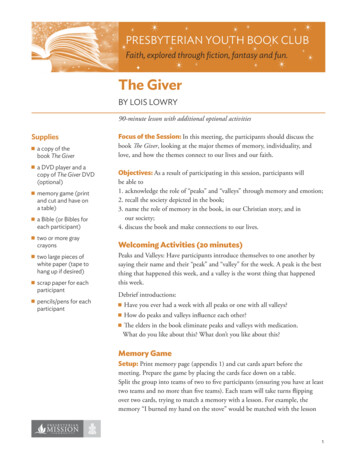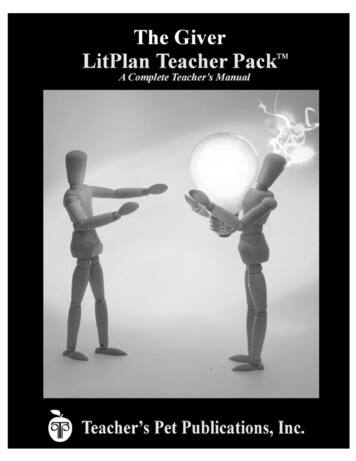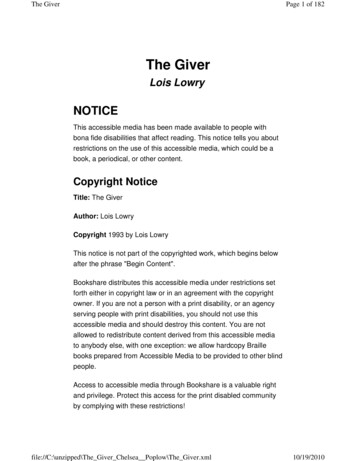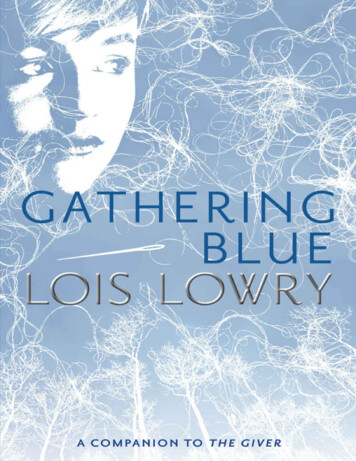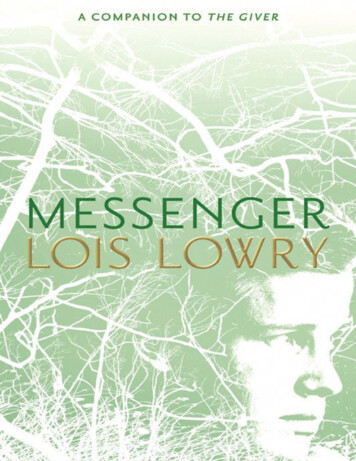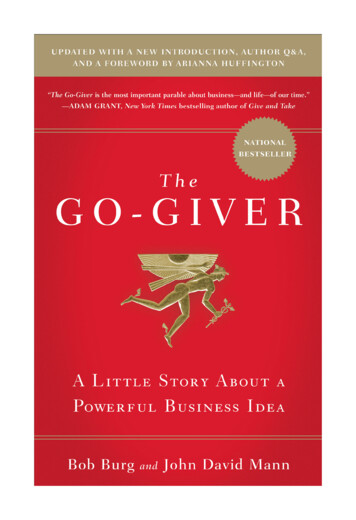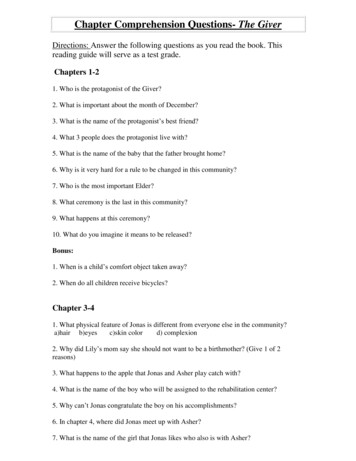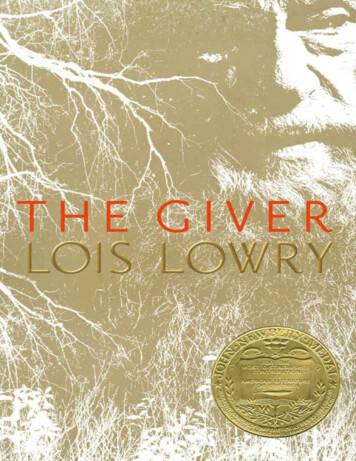
Transcription
ContentsTitle wentyTwenty-oneTwenty-twoTwenty-threeSample Chapter from GATHERING BLUEBuy the BookThe Giver QuartetAbout the Author
Text copyright 1993 by Lois LowryAll rights reserved. Originally published in hardcover in the United States by Houghton MifflinBooks for Children, an imprint of Houghton Mifflin Harcourt Publishing Company, 2000.For information about permission to reproduce selections from this book, write to Permissions,Houghton Mifflin Harcourt Publishing Company, 215 Park Avenue South, New York, New York10003.www.hmhco.comThe Library of Congress has cataloged the print edition as follows:The giver / by Lois Lowryp. cm.Summary: Given his lifetime assignment at the Ceremony of Twelve, Jonas becomes the receiver ofmemories shared by only one other in his community and discovers the terrible truth about the societyin which he lives.[1. Science fiction.] I. Title.PZ7.L9673Gi 1993 92-15034[Fic]—dc20 CIPACISBN: 978-0-547-99566-3 hardcoverISBN: 978-0-544-33626-1 paperbackeISBN 978-0-547-34590-1v8.0915
For all the childrenTo whom we entrust the future
IntroductionTwenty years? No kidding: twenty years? It’s hard to believe.Twenty years ago, I was—well, I was much younger. My parents were still alive. Two of mygrandchildren had not yet been born, and another one, now in college, was an infant.Twenty years ago I didn’t own a cell phone. I didn’t know what quinoa was and I doubt I had evertasted kale.There had recently been a war. Now we refer to that one as the First Gulf War, but back then,mercifully, we didn’t know there would be another.Maybe a lot of us weren’t even thinking about the future then. But I was. And I’m a writer.I wrote The Giver on a big machine that had recently taken the place of my much-loved typewriter,and after I printed the pages, very noisily, I had to tear them apart, one by one, at the perforated edges.(When I referred to it as my computer, someone more knowledgeable pointed out that my machinewas not a computer. It was a dedicated word processor. “Oh, okay then,” I said, as if I understood thedifference.)As I carefully separated those two hundred or so pages, I glanced again at the words I had typed onthem. I could see that I had written a complete book. It had all the elements of the seventeen or sobooks I had written before, the same things students of writing list on school quizzes: characters, plot,setting, tension, climax. (Though I didn’t reply as he had hoped to a student who emailed me someyears later, with the request “Please list all the similes and metaphors in The Giver,” I’m sure itcontained those as well.) I had typed THE END after the intentionally ambiguous final paragraphs.But I was aware that this book was different from the many I had already written.My editor, when I gave him the manuscript, realized the same thing. If I had drawn a cartoon of himreading those pages, it would have had a text balloon over his head. The text would have said,simply: Gulp.But nothing prepared me for the readers’ reactions. I had always received lots of letters from kids,frequently writing as a class assignment (one began, “This is a Friendly Letter”). Over the years, ofcourse, they have more often become emails. But that didn’t compare to the mail about The Giver:first of all for the volume—the sheer number of them (even now, twenty years later, they still come,sometimes fifty to sixty in a day). But now the letter writers were different. Sure, many of them werestill kids. But a startling number were much older. And the content was no longer the schoolassignment letter, the obligatory “I thought this was a pretty good book.” Instead the letters werepassionate (“This book has changed my life”), occasionally angry (“Jesus would be ashamed of you,”one woman wrote), and sometimes startlingly personal.One couple wrote to me about their autistic, selectively mute teenager, who had recently spoken tothem for the first time—about The Giver, urging them to read it. A teacher from South Carolina wrotethat the most disruptive, difficult student in her eighth grade class had called her at home on a noschool day and begged her to read him the next chapter over the phone. A night watchman in an oilrefinery wrote that he had happened on the book—it was lying on someone’s desk—while making hisrounds (“I’m not a reader,” he wrote me, “but man, I’m glad I came to work tonight”). A Trappistmonk wrote to me and said he considered the book a sacred text. A man who had, as an adult, fled thecult in which he had been raised, told me that his psychiatrist had recommended The Giver to him.Countless new parents have written to explain why their babies have been named Gabriel. A teacher
in rural China sent me a photograph of beaming students holding up their copies of the book. The FBItook an interest in the two-hundred-page vaguely threatening letter sent by a man who insisted that hewas actually The Giver, and advised me not to go near the city where he lived. A teenage girl wrotethat she had been considering suicide until she read The Giver. One young man wrote a proposal ofmarriage to his girlfriend inside the book and gave it to her (she said yes). But a woman told me in aletter that I was clearly a disturbed person and she hoped I would get some help.Somehow, this book, and what it has to say, has touched a lot of people from all walks of life—andfrom many cultures, since over the years it has been translated into countless languages, from Czech toHungarian to Thai. Recently I have reluctantly turned down invitations to speak about The Giver inKyrgyzstan and Korea, where I am told readers are just as affected by it as they are in Toledo andTucson.A stage adaptation of The Giver has been performed in cities and towns across the USA for years.More recently an opera has been composed and performed. And soon there will be a film. Does TheGiver have the same effect when it is presented in a different way? It’s hard to know. A book, to me,is almost sacrosanct: such an individual and private thing. The reader brings his or her own historyand beliefs and concerns, and reads in solitude, creating each scene from his own imagination as hedoes. There is no fellow ticket-holder in the next seat.The important thing is that another medium—stage, film, music—doesn’t obliterate a book. Themovie is here now, on a big screen, with stars and costumes and a score. But the book hasn’t goneaway. It has simply grown up, grown larger, and begun to glisten in a new way.—Lois Lowry
OneIT WAS ALMOST December, and Jonas was beginning to be frightened. No. Wrong word, Jonas thought.Frightened meant that deep, sickening feeling of something terrible about to happen. Frightened wasthe way he had felt a year ago when an unidentified aircraft had overflown the community twice. Hehad seen it both times. Squinting toward the sky, he had seen the sleek jet, almost a blur at its highspeed, go past, and a second later heard the blast of sound that followed. Then one more time, amoment later, from the opposite direction, the same plane.At first, he had been only fascinated. He had never seen aircraft so close, for it was against therules for Pilots to fly over the community. Occasionally, when supplies were delivered by cargoplanes to the landing field across the river, the children rode their bicycles to the riverbank andwatched, intrigued, the unloading and then the takeoff directed to the west, always away from thecommunity.But the aircraft a year ago had been different. It was not a squat, fat-bellied cargo plane but aneedle-nosed single-pilot jet. Jonas, looking around anxiously, had seen others—adults as well aschildren—stop what they were doing and wait, confused, for an explanation of the frightening event.Then all of the citizens had been ordered to go into the nearest building and stay there.IMMEDIATELY, the rasping voice through the speakers had said. LEAVE YOUR BICYCLES WHERE THEY ARE.Instantly, obediently, Jonas had dropped his bike on its side on the path behind his family’sdwelling. He had run indoors and stayed there, alone. His parents were both at work, and his littlesister, Lily, was at the Childcare Center where she spent her after-school hours.Looking through the front window, he had seen no people: none of the busy afternoon crew ofStreet Cleaners, Landscape Workers, and Food Delivery people who usually populated thecommunity at that time of day. He saw only the abandoned bikes here and there on their sides; anupturned wheel on one was still revolving slowly.He had been frightened then. The sense of his own community silent, waiting, had made hisstomach churn. He had trembled.But it had been nothing. Within minutes the speakers had crackled again, and the voice, reassuringnow and less urgent, had explained that a Pilot-in-Training had misread his navigational instructionsand made a wrong turn. Desperately the Pilot had been trying to make his way back before his errorwas noticed.NEEDLESS TO SAY, HE WILL BE RELEASED, the voice had said, followed by silence. There was anironic tone to that final message, as if the Speaker found it amusing; and Jonas had smiled a little,though he knew what a grim statement it had been. For a contributing citizen to be released from thecommunity was a final decision, a terrible punishment, an overwhelming statement of failure.Even the children were scolded if they used the term lightly at play, jeering at a teammate whomissed a catch or stumbled in a race. Jonas had done it once, had shouted at his best friend, “That’s it,Asher! You’re released!” when Asher’s clumsy error had lost a match for his team. He had been takenaside for a brief and serious talk by the coach, had hung his head with guilt and embarrassment, andapologized to Asher after the game.Now, thinking about the feeling of fear as he pedaled home along the river path, he rememberedthat moment of palpable, stomach-sinking terror when the aircraft had streaked above. It was not whathe was feeling now with December approaching. He searched for the right word to describe his ownfeeling.
Jonas was careful about language. Not like his friend, Asher, who talked too fast and mixed thingsup, scrambling words and phrases until they were barely recognizable and often very funny.Jonas grinned, remembering the morning that Asher had dashed into the classroom, late as usual,arriving breathlessly in the middle of the chanting of the morning anthem. When the class took theirseats at the conclusion of the patriotic hymn, Asher remained standing to make his public apology aswas required.“I apologize for inconveniencing my learning community.” Asher ran through the standard apologyphrase rapidly, still catching his breath. The Instructor and class waited patiently for his explanation.The students had all been grinning, because they had listened to Asher’s explanations so many timesbefore.“I left home at the correct time but when I was riding along near the hatchery, the crew wasseparating some salmon. I guess I just got distraught, watching them.“I apologize to my classmates,” Asher concluded. He smoothed his rumpled tunic and sat down.“We accept your apology, Asher.” The class recited the standard response in unison. Many of thestudents were biting their lips to keep from laughing.“I accept your apology, Asher,” the Instructor said. He was smiling. “And I thank you, becauseonce again you have provided an opportunity for a lesson in language. ‘Distraught’ is too strong anadjective to describe salmon-viewing.” He turned and wrote “distraught” on the instructional board.Beside it he wrote “distracted.”Jonas, nearing his home now, smiled at the recollection. Thinking, still, as he wheeled his bike intoits narrow port beside the door, he realized that frightened was the wrong word to describe hisfeelings, now that December was almost here. It was too strong an adjective.He had waited a long time for this special December. Now that it was almost upon him, he wasn’tfrightened, but he was . . . eager, he decided. He was eager for it to come. And he was excited,certainly. All of the Elevens were excited about the event that would be coming so soon.But there was a little shudder of nervousness when he thought about it, about what might happen.Apprehensive, Jonas decided. That’s what I am.“Who wants to be the first tonight, for feelings?” Jonas’s father asked, at the conclusion of theirevening meal.It was one of the rituals, the evening telling of feelings. Sometimes Jonas and his sister, Lily,argued over turns, over who would get to go first. Their parents, of course, were part of the ritual;they, too, told their feelings each evening. But like all parents—all adults—they didn’t fight andwheedle for their turn.Nor did Jonas, tonight. His feelings were too complicated this evening. He wanted to share them,but he wasn’t eager to begin the process of sifting through his own complicated emotions, even withthe help that he knew his parents could give.“You go, Lily,” he said, seeing his sister, who was much younger—only a Seven—wiggling withimpatience in her chair.“I felt very angry this afternoon,” Lily announced. “My Childcare group was at the play area, andwe had a visiting group of Sevens, and they didn’t obey the rules at all. One of them—a male; I don’tknow his name—kept going right to the front of the line for the slide, even though the rest of us wereall waiting. I felt so angry at him. I made my hand into a fist, like this.” She held up a clenched fistand the rest of the family smiled at her small defiant gesture.“Why do you think the visitors didn’t obey the rules?” Mother asked.
Lily considered, and shook her head. “I don’t know. They acted like . . . like . . .”“Animals?” Jonas suggested. He laughed.“That’s right,” Lily said, laughing too. “Like animals.” Neither child knew what the word meant,exactly, but it was often used to describe someone uneducated or clumsy, someone who didn’t fit in.“Where were the visitors from?” Father asked.Lily frowned, trying to remember. “Our leader told us, when he made the welcome speech, but Ican’t remember. I guess I wasn’t paying attention. It was from another community. They had to leavevery early, and they had their midday meal on the bus.”Mother nodded. “Do you think it’s possible that their rules may be different? And so they simplydidn’t know what your play area rules were?”Lily shrugged, and nodded. “I suppose.”“You’ve visited other communities, haven’t you?” Jonas asked. “My group has, often.”Lily nodded again. “When we were Sixes, we went and shared a whole school day with a group ofSixes in their community.”“How did you feel when you were there?”Lily frowned. “I felt strange. Because their methods were different. They were learning usages thatmy group hadn’t learned yet, so we felt stupid.”Father was listening with interest. “I’m thinking, Lily,” he said, “about the boy who didn’t obey therules today. Do you think it’s possible that he felt strange and stupid, being in a new place with rulesthat he didn’t know about?”Lily pondered that. “Yes,” she said, finally.“I feel a little sorry for him,” Jonas said, “even though I don’t even know him. I feel sorry foranyone who is in a place where he feels strange and stupid.”“How do you feel now, Lily?” Father asked. “Still angry?”“I guess not,” Lily decided. “I guess I feel a little sorry for him. And sorry I made a fist.” Shegrinned.Jonas smiled back at his sister. Lily’s feelings were always straightforward, fairly simple, usuallyeasy to resolve. He guessed that his own had been, too, when he was a Seven.He listened politely, though not very attentively, while his father took his turn, describing a feelingof worry that he’d had that day at work: a concern about one of the newchildren who wasn’t doingwell. Jonas’s father’s title was Nurturer. He and the other Nurturers were responsible for all thephysical and emotional needs of every newchild during its earliest life. It was a very important job,Jonas knew, but it wasn’t one that interested him much.“What gender is it?” Lily asked.“Male,” Father said. “He’s a sweet little male with a lovely disposition. But he isn’t growing asfast as he should, and he doesn’t sleep soundly. We have him in the extra care section forsupplementary nurturing, but the committee’s beginning to talk about releasing him.”“Oh, no,” Mother murmured sympathetically. “I know how sad that must make you feel.”Jonas and Lily both nodded sympathetically as well. Release of newchildren was always sad,because they hadn’t had a chance to enjoy life within the community yet. And they hadn’t doneanything wrong.There were only two occasions of release which were not punishment. Release of the elderly,which was a time of celebration for a life well and fully lived; and release of a newchild, whichalways brought a sense of what-could-we-have-done. This was especially troubling for the Nurturers,like Father, who felt they had failed somehow. But it happened very rarely.
“Well,” Father said, “I’m going to keep trying. I may ask the committee for permission to bring himhere at night, if you don’t mind. You know what the night-crew Nurturers are like. I think this little guyneeds something extra.”“Of course,” Mother said, and Jonas and Lily nodded. They had heard Father complain about thenight crew before. It was a lesser job, night-crew nurturing, assigned to those who lacked the interestor skills or insight for the more vital jobs of the daytime hours. Most of the people on the night crewhad not even been given spouses because they lacked, somehow, the essential capacity to connect toothers, which was required for the creation of a family unit.“Maybe we could even keep him,” Lily suggested sweetly, trying to look innocent. The look wasfake, Jonas knew; they all knew.“Lily,” Mother reminded her, smiling, “you know the rules.”Two children—one male, one female—to each family unit. It was written very clearly in the rules.Lily giggled. “Well,” she said, “I thought maybe just this once.”Next, Mother, who held a prominent position at the Department of Justice, talked about her feelings.Today a repeat offender had been brought before her, someone who had broken the rules before.Someone who she hoped had been adequately and fairly punished, and who had been restored to hisplace: to his job, his home, his family unit. To see him brought before her a second time caused heroverwhelming feelings of frustration and anger. And even guilt, that she hadn’t made a difference inhis life.“I feel frightened, too, for him,” she confessed. “You know that there’s no third chance. The rulessay that if there’s a third transgression, he simply has to be released.” Jonas shivered. He knew ithappened. There was even a boy in his group of Elevens whose father had been released yearsbefore. No one ever mentioned it; the disgrace was unspeakable. It was hard to imagine.Lily stood up and went to her mother. She stroked her mother’s arm.From his place at the table, Father reached over and took her hand. Jonas reached for the other.One by one, they comforted her. Soon she smiled, thanked them, and murmured that she feltsoothed.The ritual continued. “Jonas?” Father asked. “You’re last, tonight.”Jonas sighed. This evening he almost would have preferred to keep his feelings hidden. But it was,of course, against the rules.“I’m feeling apprehensive,” he confessed, glad that the appropriate descriptive word had finallycome to him.“Why is that, son?” His father looked concerned.“I know there’s really nothing to worry about,” Jonas explained, “and that every adult has beenthrough it. I know you have, Father, and you too, Mother. But it’s the Ceremony that I’m apprehensiveabout. It’s almost December.”Lily looked up, her eyes wide. “The Ceremony of Twelve,” she whispered in an awed voice. Eventhe smallest children—Lily’s age and younger—knew that it lay in the future for each of them.“I’m glad you told us of your feelings,” Father said.“Lily,” Mother said, beckoning to the little girl, “Go on now and get into your nightclothes. Fatherand I are going to stay here and talk to Jonas for a while.”Lily sighed, but obediently she got down from her chair. “Privately?” she asked.Mother nodded. “Yes,” she said, “this talk will be a private one with Jonas.”
TwoJONAS WATCHED AS his father poured a fresh cup of coffee. He waited.“You know,” his father finally said, “every December was exciting to me when I was young. And ithas been for you and Lily, too, I’m sure. Each December brings such changes.”Jonas nodded. He could remember the Decembers back to when he had become, well, probably aFour. The earlier ones were lost to him. But he observed them each year, and he remembered Lily’searliest Decembers. He remembered when his family received Lily, the day she was named, the daythat she had become a One.The Ceremony for the Ones was always noisy and fun. Each December, all the newchildren born inthe previous year turned One. One at a time—there were always fifty in each year’s group, if nonehad been released—they had been brought to the stage by the Nurturers who had cared for them sincebirth. Some were already walking, wobbly on their unsteady legs; others were no more than a fewdays old, wrapped in blankets, held by their Nurturers.“I enjoy the Naming,” Jonas said.His mother agreed, smiling. “The year we got Lily, we knew, of course, that we’d receive ourfemale, because we’d made our application and been approved. But I’d been wondering andwondering what her name would be.”“I could have sneaked a look at the list prior to the ceremony,” Father confided. “The committeealways makes the list in advance, and it’s right there in the office at the Nurturing Center.“As a matter of fact,” he went on, “I feel a little guilty about this. But I did go in this afternoon andlooked to see if this year’s Naming list had been made yet. It was right there in the office, and Ilooked up number Thirty-six—that’s the little guy I’ve been concerned about—because it occurred tome that it might enhance his nurturing if I could call him by a name. Just privately, of course, when noone else is around.”“Did you find it?” Jonas asked. He was fascinated. It didn’t seem a terribly important rule, but thefact that his father had broken a rule at all awed him. He glanced at his mother, the one responsiblefor adherence to the rules, and was relieved that she was smiling.His father nodded. “His name—if he makes it to the Naming without being released, of course—isto be Gabriel. So I whisper that to him when I feed him every four hours, and during exercise andplaytime. If no one can hear me.“I call him Gabe, actually,” he said, and grinned.“Gabe.” Jonas tried it out. A good name, he decided.Though Jonas had only become a Five the year that they acquired Lily and learned her name, heremembered the excitement, the conversations at home, wondering about her: how she would look,who she would be, how she would fit into their established family unit. He remembered climbing thesteps to the stage with his parents, his father by his side that year instead of with the Nurturers, sinceit was the year that he would be given a newchild of his own.He remembered his mother taking the newchild, his sister, into her arms, while the document wasread to the assembled family units. “Newchild Twenty-three,” the Namer had read. “Lily.”He remembered his father’s look of delight, and that his father had whispered, “She’s one of myfavorites. I was hoping for her to be the one.” The crowd had clapped, and Jonas had grinned. Heliked his sister’s name. Lily, barely awake, had waved her small fist. Then they had stepped down tomake room for the next family unit.
“When I was an Eleven,” his father said now, “as you are, Jonas, I was very impatient, waiting forthe Ceremony of Twelve. It’s a long two days. I remember that I enjoyed the Ones, as I always do, butthat I didn’t pay much attention to the other ceremonies, except for my sister’s. She became a Ninethat year, and got her bicycle. I’d been teaching her to ride mine, even though technically I wasn’tsupposed to.”Jonas laughed. It was one of the few rules that was not taken very seriously and was almost alwaysbroken. The children all received their bicycles at Nine; they were not allowed to ride bicyclesbefore then. But almost always, the older brothers and sisters had secretly taught the younger ones.Jonas had been thinking already about teaching Lily.There was talk about changing the rule and giving the bicycles at an earlier age. A committee wasstudying the idea. When something went to a committee for study, the people always joked about it.They said that the committee members would become Elders by the time the rule change was made.Rules were very hard to change. Sometimes, if it was a very important rule—unlike the onegoverning the age for bicycles—it would have to go, eventually, to The Receiver for a decision. TheReceiver was the most important Elder. Jonas had never even seen him, that he knew of; someone in aposition of such importance lived and worked alone. But the committee would never bother TheReceiver with a question about bicycles; they would simply fret and argue about it themselves foryears, until the citizens forgot that it had ever gone to them for study.His father continued. “So I watched and cheered when my sister, Katya, became a Nine andremoved her hair ribbons and got her bicycle,” Father went on. “Then I didn’t pay much attention tothe Tens and Elevens. And finally, at the end of the second day, which seemed to go on forever, it wasmy turn. It was the Ceremony of Twelve.”Jonas shivered. He pictured his father, who must have been a shy and quiet boy, for he was a shyand quiet man, seated with his group, waiting to be called to the stage. The Ceremony of Twelve wasthe last of the Ceremonies. The most important.“I remember how proud my parents looked—and my sister, too; even though she wanted to be outriding the bicycle publicly, she stopped fidgeting and was very still and attentive when my turn came.“But to be honest, Jonas,” his father said, “for me there was not the element of suspense that thereis with your Ceremony. Because I was already fairly certain of what my Assignment was to be.”Jonas was surprised. There was no way, really, to know in advance. It was a secret selection,made by the leaders of the community, the Committee of Elders, who took the responsibility soseriously that there were never even any jokes made about Assignments.His mother seemed surprised, too. “How could you have known?” she asked.His father smiled his gentle smile. “Well, it was clear to me—and my parents later confessed that ithad been obvious to them, too—what my aptitude was. I had always loved the newchildren more thananything. When my friends in my age group were holding bicycle races, or building toy vehicles orbridges with their construction sets, or—”“All the things I do with my friends,” Jonas pointed out, and his mother nodded in agreement.“I always participated, of course, because as children we must experience all of those things. And Istudied hard in school, as you do, Jonas. But again and again, during free time, I found myself drawnto the newchildren. I spent almost all of my volunteer hours helping in the Nurturing Center. Of coursethe Elders knew that, from their observation.”Jonas nodded. During the past year he had been aware of the increasing level of observation. Inschool, at recreation time, and during volunteer hours, he had noticed the Elders watching him and the
other Elevens. He had seen them taking notes. He knew, too, that the Elders were meeting for longhours with all of the instructors that he and the other Elevens had had during their years of school.“So I expected it, and I was pleased, but not at all surprised, when my Assignment was announcedas Nurturer,” Father explained.“Did everyone applaud, even though they weren’t surprised?” Jonas asked.“Oh, of course. They were happy for me, that my Assignment was what I wanted most. I felt veryfortunate.” His father smiled.“Were any of the Elevens disappointed, your year?” Jonas asked. Unlike his father, he had no ideawhat his Assignment would be. But he knew that some would disappoint him. Though he respectedhis father’s work, Nurturer would not be his wish. And he didn’t envy Laborers at all.His father thought. “No, I don’t think so. Of course the Elders are so careful in their observationsand selections.”“I think it’s probably the most important job in our community,” his mother commented.“My friend Yoshiko was surprised by her selection as Doctor,” Father said, “but she was thrilled.And let’s see, there was Andrei—I remember that when we were boys he never wanted to dophysical things. He spent all the recreation time he could with his construction set, and his volunteerhours were always on building sites. The Elders knew that, of course. Andrei was given theAssignment of Engineer and he was delighted.”“Andrei later designed the bridge that crosses the river to the west of town,” Jonas’s mother said.“It wasn’t there when we were children.”“There are very rarely disappointments, Jonas. I don’t think you need to worry about that,” hisfather reassured him. “And if there are, you know there’s an appeal process.” But they all laughed atthat—an appeal went to a committee for study.“I worry a little about Asher’s Assignment,” Jonas confessed. “Asher’s such fun. But he doesn’treally have any serious interests. He makes a game out of everything.”His father chuckled. “You know,” he said, “I remember when Asher was a newchild at theNurturing Center, before he was named. He never cried. He giggled and laughed at everything. All ofus on the staff enjoyed nurturing Asher.”“The Elders know Asher,” his mother said. “They’ll find exactly the right As
A stage adaptation of The Giver has been performed in cities and towns across the USA for years. More recently an opera has been composed and performed. And soon there will be a film. Does The Giver have the same effect when it is presented in a different way? It’s hard to know. A book, to me, is almost sacrosanct: such an individual and .File Size: 1MBPage Count: 123
